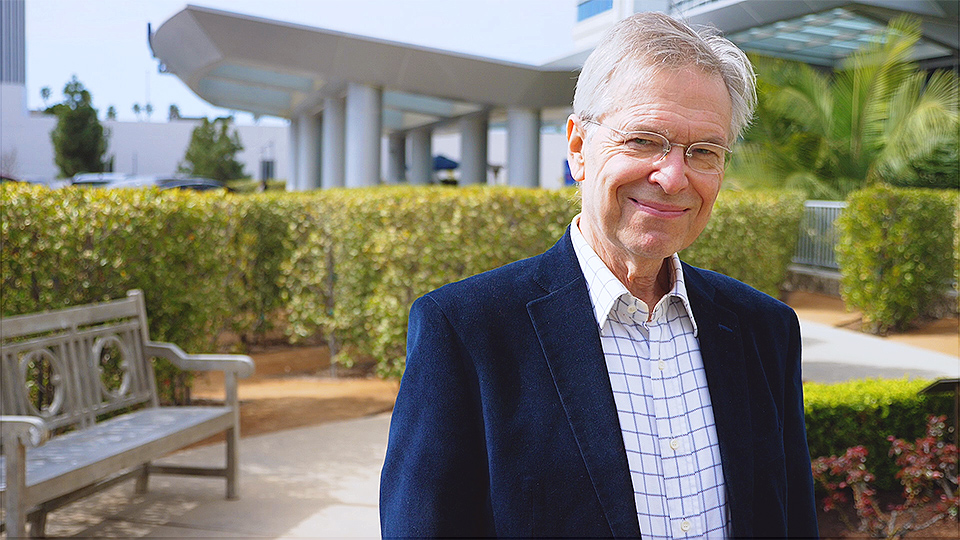
A heart-felt story about the human condition that inspires kindness: take one.
Meet Peter Markham, a published author, and film instructor. Peter gracefully chats about his experiences while diagnosed with esophageal cancer with Saint John’s Cancer Institute in a video testimonial 10 years later.
“I didn’t see it as a battle. I saw it as a process of collaboration with everyone; with acceptance to nature and to the world.”
Finding acceptance during cancer
Acceptance became the vehicle for Peter to find meaning, for which propelled him onward. He said, “I found that I had every reason to keep going: my love for my family in England; my mother, my sister, my niece and nephew, my love for my wife, and my students. I enjoy being in class with them. I did something in my life that I believed in. Even if things didn’t work out, I had it pretty good.”
Peter’s capacity to come to terms with his reality and circumstances places him apart from other survivor stories. He accepted the outcome of his survivability. While everyone is fortunate to survive cancer, few survive esophageal cancer; it is a very rare cancer and one even more rare to survive. In 2020, an estimated 20,640 adults, of which 16,510 were men and 4,130 were women, were diagnosed with esophageal cancer in the United States. Of those diagnosed, an estimated 80 percent did not survive.1 Peter remarks:
I would not want to repeat the experience of having had cancer. But there [are] certain aspects of it for which I am… strangely enough, very grateful. One of those is, I have a new regard for life: the value of my life and the gratitude for it. I continue to teach my students, some of whom are leading film makers in the world; I finished and published my first book, now I am working on finishing my second book; I continue to teach classes (Peter used to teach at AFI Conservatory in Los Angeles). I feel that I am a part of everything, humanity, and the universe. There is an upside.
Peter Markham’s Remarkable Story: Esophageal Cancer
How does someone with no risk factors develop symptoms of esophageal cancer?
Though Peter was not at risk, Peter did develop one symptom linked to esophageal cancer which he disregarded at first—hardships swallowing food. Typical symptoms related to esophageal cancer include, unintentional weight loss, chest pain, heart burn, indigestion, coughing, hoarse voice, none of which Peter experienced.2
When Peter learned he had cancer, in July 2012, his original symptom associated with esophageal cancer did not lead to this discovery. His wife noticed his skin color had change—he was anemic— not a symptom of esophageal cancer but rather a complication, though symptoms generally are associated to a risk factor.3
Risk factors for esophageal cancer include smoking, alcohol, gender, age, diet/nutrition, obesity, achalasia, HPV, Barrett’s esophagus, and race. Smoking is the number one risk factor. Researchers suggest genetics play a bigger role in those with no known risk factors.2,4
If it were not for Peter’s wife, a fashion designer who consequently designed some of Michelle Obama’s dresses during President Obama’s first and second term, and her keen ability to see slight variations in color, Peter may not have discovered he had cancer when he did.
It is possible that an annual physical with a primary care physician could have identified Peter’s condition sooner. He mentions he hadn’t had a physical in two years prior to becoming anemic and expressed regrets not going.
What treatments are available to those with esophageal cancer?
In situations such as Peter’s, the best outcome came from receiving the best available treatments.
Dr. Anton Bilchik is the Chief of General Surgery, Director of Gastrointestinal and Hepatobiliary Program and Research at Saint John’s Health Center and Saint John’s Cancer Institute whom performed an esophagectomy on Peter in late 2012. Before Peter received surgery he went through chemotherapy and radiation in order to reduce the tumor size, a technique known as neoadjuvant therapy and widely recognized.3
Peter gives us his account of Dr. Bilchik just before surgery, “[Dr. Bilchik] asked me, ‘shall we do it,’ and I said, ‘yes, let’s do it!’” Peter reports this type of concern and care for himself from Dr. Bilchik helped him regain a sense of agency through a process in which he was consistently relying on others.
Why is the mortality rate for esophageal cancer so high?
Undetected cancer leads to increased spread (metastasis). Cancer mortality rates, misdiagnosis, and undiagnosed cancers have been linked to the absence of screenings, and screenings for esophageal cancer may cause more harm than good.5 According to American Society of Clinical Oncology (ASCO), “Regular screening tests to find esophageal cancer in people without symptoms are not used in the United States.”6
The solution for many ailments, including prevention of cancer, may hinge on regular and continuous medical physicals, which are extremely important as we mature. As our bodies age, any disregarded signs or symptoms could mean something more significant later. Simply, our bodies don’t heal as fast as we age, and they may not heal at all.
What advice does a cancer survivor have to those with esophageal cancer?
“My advice to those who have cancer is, be kind to yourself and to those around you; value the relationships that you have and take nourishment and sustenance from them.”
Resources:
- Esophageal Cancer: Statistics (Cancer.net)
- Signs and Symptoms of Esophageal Cancer (Cancer.org)
- Correlations Between Neoadjuvant Treatment, Anemia, and Perioperative Complications in Patients Undergoing Esophagectomy for Cancer
- Esophageal Cancer (Cancer.gov)
- Esophageal Cancer Screening (PDQ®) NIH
- Esophageal Cancer: Screening (Cancer.net)

